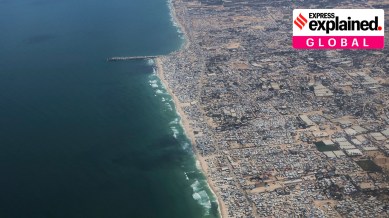BCG analysed plan to ‘relocate’ Gazans to Somalia: What Financial Times’ report found
What kind of work did the consultancy firm BCG do on Gaza, and why did it later disavow it? We explain.

The Boston Consulting Group (BCG) reportedly drew plans to analyse how Palestinians in Gaza could be shifted to other countries, including Somalia, under a project to “redevelop” a region which has long seen conflict over land and identity.
The Financial Times reported the story on Thursday (August 7), citing people familiar with the work. It said the consultancy firm created a spreadsheet “on behalf of Israeli businessmen who were sketching plans for the redevelopment of Gaza after the war between Hamas and Israel.” The FT first reported on the plan last month.
monthly limit of free stories.
with an Express account.
BCG CEO Christoph Schweizer earlier said the entire episode had been “reputationally very damaging” for the firm. It came just a few months after US President Donald Trump held a press conference with Israeli Prime Minister Benjamin Netanyahu, saying the US will “take over Gaza and…do a job with it too”. He added that America will “own” Gaza and turn it into the “Riviera of the Middle East”.
Here is what to know about BCG’s role, the fallout, and the massive criticism that followed.
What exactly did BCG do on Gaza?
According to the FT’s investigation, BCG was contracted for around seven months for the “relocation” project, at roughly $4 million (around Rs 35 crore). “One scenario estimated more than 500,000 Gazans would leave the enclave with “relocation packages” worth $9,000 per person, or around $5bn in total,” it said. Gaza’s total population is around 2 million.
The advisory firm Tony Blair Institute (TBI), founded by the former UK Prime Minister, also saw two staff members participate in message groups and calls as the project developed.
Additionally, BCG was involved in establishing the Israel- and US-backed Gaza Humanitarian Foundation. The GHF, which began operations in late May, has been criticised for failing to provide aid comprehensively and for the deaths of Palestinians who attempted to secure aid from its centres.
Just this week, UN experts described it as an “utterly disturbing example of how humanitarian relief can be exploited for covert military and geopolitical agendas in serious breach of international law.” They also mentioned “The entanglement of Israeli intelligence, US contractors and ambiguous non-governmental entities”.
BCG was originally engaged by Orbis, a US-based security contractor, for a feasibility study for the aid operation. This was done on a pro bono basis, meaning the clients were not charged for it. Orbis prepared the study on behalf of the Tachlith Institute, an Israeli think-tank.
The latest FT report said that Somalia and the breakaway region of Somaliland were on the list of locations for “relocating” the people of Gaza, along with the United Arab Emirates, Egypt and Jordan. It is in line with recent media reports of the US and Israeli governments sounding out countries in East Africa about taking in Palestinian refugees.
What was the BCG’s response?
The BCG said the two partners involved with the GHF initially began the work on a pro bono basis and “then carried out subsequent unauthorized work”. The company disavowed this work and said they were not paid for it.
On the reconstruction plan work, it said the company’s role was being “misrepresented”. “Two former partners initiated this work, even though the lead partner was categorically told not to,” it added, disavowing the work.
The TBI also asserted that it “saw” the slide deck but “didn’t create it”. The deck in question was a slideshow on potential projects, such as an “Elon Musk Smart Manufacturing Zone” on the Gaza-Israel border, where US electric vehicle companies would build cars for export to Europe.
It also included the “Gaza Trump Riviera & Islands”, serving as “world class resorts along the coastline and on small artificial islands similar to the Palm Islands in Dubai”.
And what was the fallout?
Following the newspaper’s July report, the international NGO Save the Children suspended its 20-year partnership with BCG. The UK Parliament’s Business and Trade Committee further asked the BCG CEO to respond to its questions, seeking the details of the plan.
The company also came under fire for participating in a plan for displacing Palestinians, many of whom are currently internally displaced within Gaza as a result of Israeli shelling. The Riviera suggestion also took the world by surprise when Trump announced it, as it would have violated long-standing UN resolutions supporting the Palestinian right of self-determination (which India has also backed at the United Nations), and international law, including against ethnic cleansing.
The GHF, meanwhile, has continued to attract severe criticism over its functioning, as images and video from Gaza show emaciated people due to Israel blocking aid delivery. NGOs and relief agencies, such as Doctors Without Borders or Médecins Sans Frontières, and UN experts have called for the GHF’s closure. MSF said in a statement, “In MSF’s nearly 54 years of operations, rarely have we seen such levels of systematic violence against unarmed civilians.” It described the GHF-run food distributions in Gaza as sites of “orchestrated killing and dehumanisation”.
Further, there is not much progress on Trump’s Riviera plan, but Israel has increasingly indicated plans to occupy all of Gaza. According to the BBC, Israel’s security cabinet met on Thursday to make a decision, with its military forces currently controlling three-fourths of Gaza.